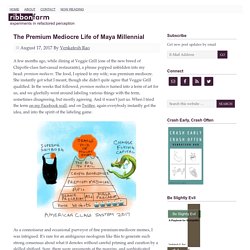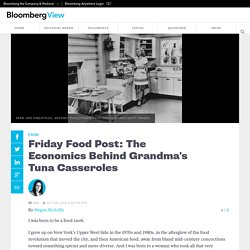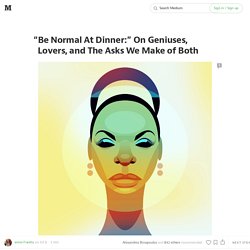

Zadie Smith on the genius of Graham Greene. "I had to find a religion," said Graham Greene, "to measure my evil against.

" This puts Greene the "Catholic novelist" (a description he detested) into correct perspective: before he chose Christ as his highest value, he was first a man obsessed with scale itself. No 20th-century writer had a subtler mind for human comparison. Where lesser novelists deploy broad strokes to separate good guy from bad, Greene was the master of the multiple distinction: the thin lines that separate evil from cruelty from unkindness from malevolent stupidity. His people exist within a meticulously calibrated moral system.
The Premium Mediocre Life of Maya Millennial. A few months ago, while dining at Veggie Grill (one of the new breed of Chipotle-class fast-casual restaurants), a phrase popped unbidden into my head: premium mediocre.

The food, I opined to my wife, was premium mediocre. She instantly got what I meant, though she didn’t quite agree that Veggie Grill qualified. In the weeks that followed, premium mediocre turned into a term of art for us, and we gleefully went around labeling various things with the term, sometimes disagreeing, but mostly agreeing. Am I In a Codependent Relationship With My Dog? Dog lovers are codependent and terrible at relationships. Two scientific studies have hit the presses in the last month, touting the same conclusion: cats just don’t love us.

Not the way that dogs do, anyway. But the results of both studies have been misinterpreted. In fact, a more in-depth examination of both studies and the way that their results have been reported suggests a different conclusion entirely, namely: dog lovers are emotionally stunted and terrible at relationships. Vocal responses A study by Atsuko Saito and Kazutaka Shinozuka at the University of Tokyo was published by the journal Animal Cognition with the title, Vocal recognition of owners by domestic cats (Felis catus).
When Crack Was King: 1980s New York In Photos. The city that never sleeps.

Well, rarely anyway. 1984. Source: Horvatland Television shows like Girls and Sex and the City present a New York City where the “worst” that can happen on a wild night out is accidentally losing your debit card or your integrity. But until recently, the city could be a pretty terrifying place. A Remarkable Armored Train Fought Its Way Across Eurasia — War Is Boring. By JAMES SIMPSON The war train Zaamurets was the behemoth of the 1910s and 1920s.

Heavily armored. Bristling with guns. Everywhere it went, Zaamurets was the biggest, baddest thing around. Not many foes could touch it. Even more stunning, this awesome, self-propelled war machine went on a journey across the world. Which is why everyone wanted it. Zaamurets’ story is tangled up with the Russian Revolution of 1917. Life Before Death at the Wellcome Collection. Friday Food Post: The Economics Behind Grandma's Tuna Casseroles. I was born to be a food snob.

I grew up on New York’s Upper West Side in the 1970s and 1980s, in the afterglow of the food revolution that moved the city, and then American food, away from bland mid-century concoctions toward something spicier and more diverse. And I was born to a woman who took all that very seriously. My mother arrived in New York with a solid grounding in the basics, and painstakingly taught herself to make fish sauces that took three days to prepare properly. She made her own croissants from scratch. We were the sort of people who did our grocery shopping like a trade caravan moving from oasis to oasis. If this sounds unbearably precious, it wasn’t, because the great blessing of my life is that my mother did not let me become a food snob.
So I’m always a bit bemused when I read articles pondering why our grandparents cooked such dreadful food. 50 Years After the Moynihan Report, Examining the Black Family in the Age of Mass Incarceration. Never marry again in slavery. “Be Normal At Dinner:” On Geniuses, Lovers, and The Asks We Make of Both. “Be Normal At Dinner:” On Geniuses, Lovers, and The Asks We Make of Both “It is very painful, I think, to be told: ‘You enchanted the world for me, you made me feel things I never knew I could, now please be normal at dinner.’

We are always saying this to people in one way or another, of course; maybe we have to.” - Brian Phillips, “Run to the Devil: The Ghosts and Grace of Nina Simone” Ever since running across this line, I’ve been repeating it over and over in my head, kneading it back and forth the way a hand kneads a tight muscle. In a piece full of sharp and insightful observations, this particular line haunted me because it captures something of the way we tangle up love, fascination and entitlement — an act that is at once inherently human, terribly relatable, and supremely fucked up and tragic.
It’s certainly true of our relationship to those we find most inspiring, as Phillips articulates so elegantly with specific regard to Nina Simone.
On Gender and Sexuality. Comics and Games and Tyranny, Oh My! On Language. On Social Media. Annelise's Notebooks - Written. On Race. On Money.